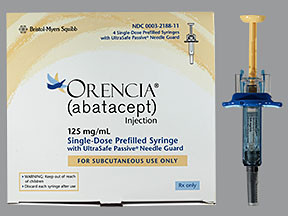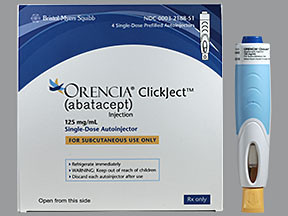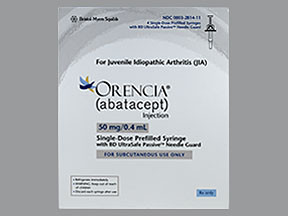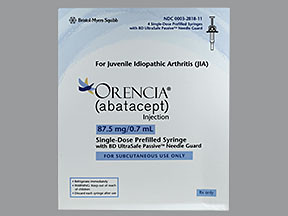ABATACEPT - SUBCUTANEOUS INJECTION
PHONETIC PRONUNCIATION: (a-BAT-a-sept)
COMMON BRAND NAME(S): Orencia
GENERIC NAME(S): abatacept
Uses
USES: This medication is used to treat rheumatoid arthritis, a condition in which the body's own defense system (immune system) attacks healthy tissue. This leads to swelling in the joints, which causes pain and makes it harder to move. Abatacept works by weakening your immune system. This effect helps to slow down joint damage and reduce joint pain and swelling so you can move better. This medication is also used to treat other types of arthritis (such as juvenile idiopathic arthritis, psoriatic arthritis).
How to use ABATACEPT - SUBCUTANEOUS INJECTION
HOW TO USE: Read the Patient Information Leaflet and Instructions for Use provided by your pharmacist before you start receiving abatacept and each time you get a treatment. If you have any questions, ask your doctor or pharmacist. This drug is given by injection under the skin of your thigh, abdomen, or upper arm as directed by your doctor, usually once a week. Your doctor may direct you to first receive abatacept by injection into a vein (loading dose) before starting treatment with this form of the medication. If you are switching from regularly scheduled injections into a vein, carefully follow your doctor's directions for when to start using this medication (usually instead of the next scheduled dose). The dosage is based on your medical condition and response to treatment. In children, the dosage is also based on weight. Remove this medication from the refrigerator and leave it at room temperature for 30 to 60 minutes before injecting. Do not warm up this medication any other way. For example, do not heat it in the microwave or place it in hot water. If you are using this medication at home, learn all preparation and usage instructions from your health care professional. Before using, check this product visually for particles or discoloration. If either is present, do not use the liquid. Before injecting each dose, clean the injection site with rubbing alcohol. Change the injection site each time to lessen injury under the skin. Do not inject into any areas of skin that are sore, bruised, red, scaly, or hard. Learn how to store and discard medical supplies safely. Use this medication regularly to get the most benefit from it. To help you remember, mark your calendar to keep track of when you need to receive the next dose. Tell your doctor if your symptoms do not get better or if they get worse.
Side Effects
Precautions
Interactions
Overdose
Images
Reviews
Disclaimer
IMPORTANT: HOW TO USE THIS INFORMATION: This is a summary and does NOT have all possible information about this product. This information does not assure that this product is safe, effective, or appropriate for you. This information is not individual medical advice and does not substitute for the advice of your health care professional. Always ask your health care professional for complete information about this product and your specific health needs.




No Reviews Yet